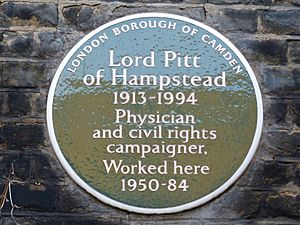David Pitt, Baron Pitt of Hampstead facts for kids
Quick facts for kids
The Lord Pitt
|
|
|---|---|
| Born |
David Thomas Pitt
3 October 1913 Hampstead, St. David's Parish, Grenada
|
| Died | 18 December 1994 (aged 81) London, UK
|
| Alma mater | University of Edinburgh |
| Occupation | Medical practitioner, politician and activist. |
| Spouse(s) | Dorothy (née Alleyne), Lady Pitt (m. 1943) |
| Children | 1 son, 2 daughters |
David Thomas Pitt, Baron Pitt of Hampstead (born October 3, 1913 – died December 18, 1994) was an important British politician, doctor, and activist. He was born in Grenada, a Caribbean island. He became the second person of African descent to join the House of Lords, which is part of the UK Parliament. He was given a special title called a "life peer" in 1975. Lord Pitt was also the longest-serving Black person in the British Parliament.
Contents
Early Life and Medical Career
David Pitt grew up in Hampstead, St. David's Parish, Grenada. He went to local schools there. In 1932, he won a special scholarship that allowed him to study abroad. He chose to study medicine at the University of Edinburgh in Scotland. He graduated with high honors in 1938.
While studying, David Pitt saw a lot of poverty in Edinburgh. He noticed how similar it was to the poverty he saw in Grenada. This made him believe that being poor often led to people getting sick. In 1936, he joined the Labour movement, which aimed to help working-class people.
After finishing his studies, he returned to the Caribbean. He worked as a doctor in Saint Vincent and later in Trinidad and Tobago. In 1941, he started his own medical practice in San Fernando, Trinidad. He also became a local council member there.
David Pitt was very passionate about fairness and justice. In 1943, he helped start the West Indian National Party (WINP). This party wanted Caribbean countries to govern themselves. They pushed for Trinidad and Tobago to have self-rule and for important industries like oil and sugar to be controlled by the country.
Their hard work paid off. In 1945, the people of Trinidad and Tobago gained the right to vote. David Pitt continued his activism. In 1947, he traveled to Britain to ask the government for a West Indies Federation. This would have created a group of self-governing Caribbean islands.
Later in 1947, David Pitt moved to London, England. He opened a medical practice in the Euston area. He treated all his patients, no matter their background.
Political Journey in Britain
David Pitt became very active in British politics. In 1959, he was the first person of African descent to run for a seat in the UK Parliament. He stood for the Labour Party in Hampstead, North London.
During his campaign, he faced unfair treatment because of his race. Despite these challenges, he refused to give up. After the election, he helped create the Campaign Against Racial Discrimination. This group worked to fight against racism.
In 1961, David Pitt was elected to the London County Council (LCC). This was a big step, as he was the first Black person elected to this important local government role. He continued to serve on the LCC and its next version, the Greater London Council (GLC), until 1975. He even became the deputy leader of the GLC from 1969 to 1970. In 1974, he made history again by becoming the first Black person to chair the GLC.
He tried to become a Member of Parliament (MP) again in 1970. However, he was not successful. Again, racism played a part in the election.
In 1975, the Prime Minister, Harold Wilson, suggested that David Pitt should join the House of Lords. He was given the title Baron Pitt of Hampstead. This made him the second person of African-Caribbean heritage to become a peer in the House of Lords.
As a member of the House of Lords, Lord Pitt worked hard for the Race Relations Act 1976. This law aimed to prevent discrimination. He spoke out strongly on issues like immigration. He believed that reducing the number of Black immigrants would not improve race relations. He argued that fear often comes from not knowing people. He said that people who live, work, and play with Black people usually have the least hostility towards them.
Lord Pitt was also a leader in the fight against apartheid in South Africa. Apartheid was a system of racial segregation and discrimination. He organized protest meetings from his doctor's office in London.
He was known for his strong views. He encouraged more ethnic minorities to join the police force. This idea surprised some people. He once said, "Some black people regard me as an Uncle Tom, while some whites regard me as a Black Power revolutionary. So I imagine I got it about right." This shows he was trying to find a middle ground and do what he thought was best.
In 1983, to celebrate his 70th birthday, The Lord Pitt Foundation was created. From 1985 to 1986, Lord Pitt was the president of the British Medical Association. He considered this his greatest honor.
Personal Life
In 1943, David Pitt married Dorothy Elaine Alleyne. They met in Trinidad. They had three children: a son named Bruce and two daughters named Phyllis and Amanda. Lord Pitt passed away in London on December 18, 1994, at the age of 81.
Recognition and Legacy
In 2004, David Pitt was named one of the "100 Great Black Britons" during Black History Month.
Since 2009, an annual "Lord David Pitt Memorial Lecture" is held in London. This event celebrates his life and work.
A special plaque can be found at 200 North Gower Street in Camden, London. It marks the building where Lord Pitt worked as a doctor for many years, from 1950 to 1984.
 | Precious Adams |
 | Lauren Anderson |
 | Janet Collins |


